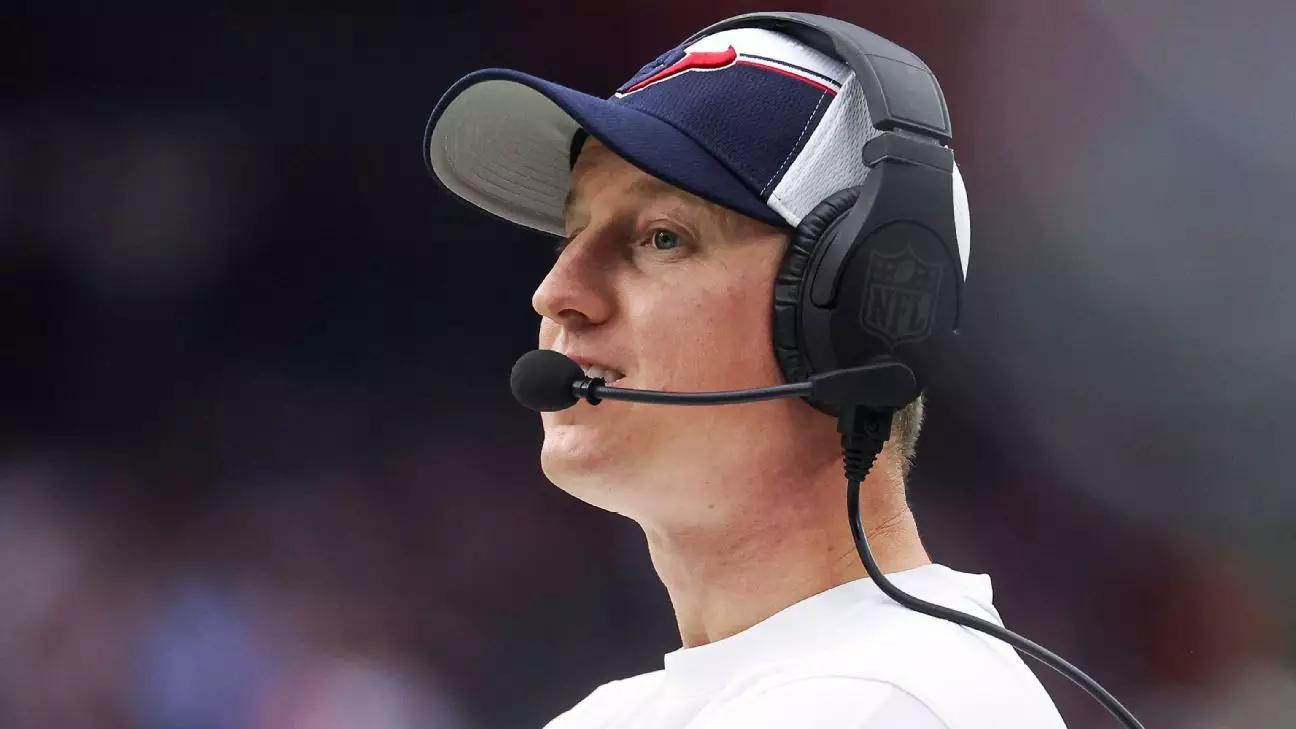The Houston Texans recently made significant changes to their coaching staff, including the dismissal of offensive coordinator Bobby Slowik, offensive line coach Chris Strausser, and assistant offensive line coach Cole Popovich. This move has sent waves through the team’s fan base and media circles alike. While it’s common in the NFL to evaluate coaching staff after a season, drawing insight from the Texans’ season performance raises questions about offensive strategies and overall team direction.
Despite the Texans securing the AFC South title with a 10-7 record in 2024, the offensive output was notably underwhelming. Finishing 18th in scoring (22.1 points per game) and 16th in total offense (329 yards per game) creates a paradox: a postseason appearance accompanied by a largely ineffective offense. The discrepancy suggests that while the Texans had a commendable season overall, their offensive struggles hindered potential further advancements. Coach DeMeco Ryans’ acknowledgment of the need for improvement indicates that despite the accolades, substantial changes were necessary.
A notable concern was quarterback C.J. Stroud’s alarming regression after a promising rookie season. In 2024, Stroud threw for 3,727 yards and finished tied for 15th in touchdown passes with 20, a stark contrast to his rookie campaign where he paced the league. Factors contributing to this decline include a beleaguered offensive line that allowed Stroud to endure 52 sacks and significant pressure on over a third of his dropbacks. These figures not only reflect the offensive line’s struggles but also highlight a systemic failure in developing a cohesive and effective offensive strategy.
Furthermore, the Texans’ inability to score in the second half of games doesn’t just point to a mere lack of execution. Averaging a dismal 7.5 points in the second half—ranking them the lowest in the league—raises concerns about play-calling, the ability to adapt in-game, and overall offensive creativity. The staggering realization that the Texans went several consecutive weeks without scoring an offensive touchdown speaks volumes about the coaching staff’s failure to adjust and innovate under pressure.
Entering the 2024 season, the Texans’ offense appeared promising with Pro Bowl additions like wide receiver Stefon Diggs and running back Joe Mixon. However, Diggs’ unfortunate injury during a pivotal match against the Indianapolis Colts derailed what could have been a transformative season. Even with Mixon contributing over 1,000 rushing yards, the offense frequently faltered in crucial situations, particularly on third downs and red zone efficiency—ranked 17th and 28th respectively. The mounting frustrations illustrate the challenges of high expectations against a backdrop of pivotal injuries and a struggling offensive scheme.
The decision to part ways with Slowik, who was originally brought on by Ryans after their successful tenure together in San Francisco, signals a desire for change. Ryans’ brief remarks about Slowik’s performance were telling; while he noted growth, the underlying message was clear: the offensive unit needed a stronger push for success. As the Texans prepare to welcome a new offensive coordinator, the choice will play a crucial role in shaping the team’s future.
The new hire will need to address the festering issues within the offensive line, bolster Stroud’s confidence, and create an adaptable playbook that responds effectively to game situations. The Texans possess the talent required for success, but without a strategic overhaul and capable leadership, they risk repeating the same shortcomings that led to this coaching upheaval.
The Texans face a critical juncture as they look to revitalize their offensive strategy. The dismissal of Slowik and his associates is not just about removing underperformers; it represents a broader call for a renewed vision that embraces both their existing talent and their aspirations for future success. The upcoming choices will be pivotal for setting a new course for Houston’s franchise.

